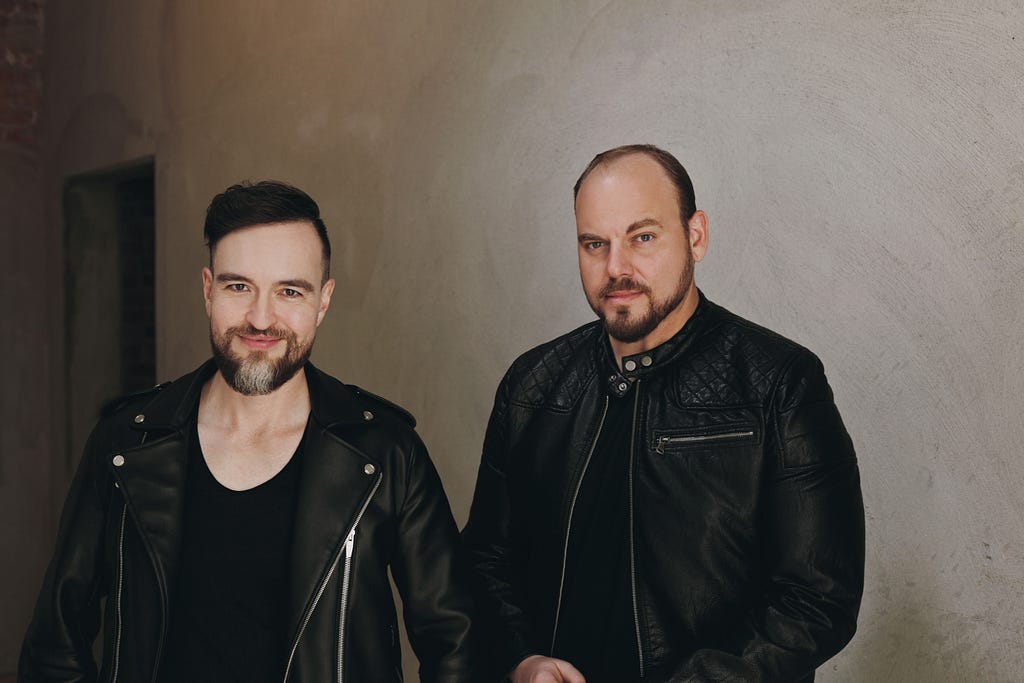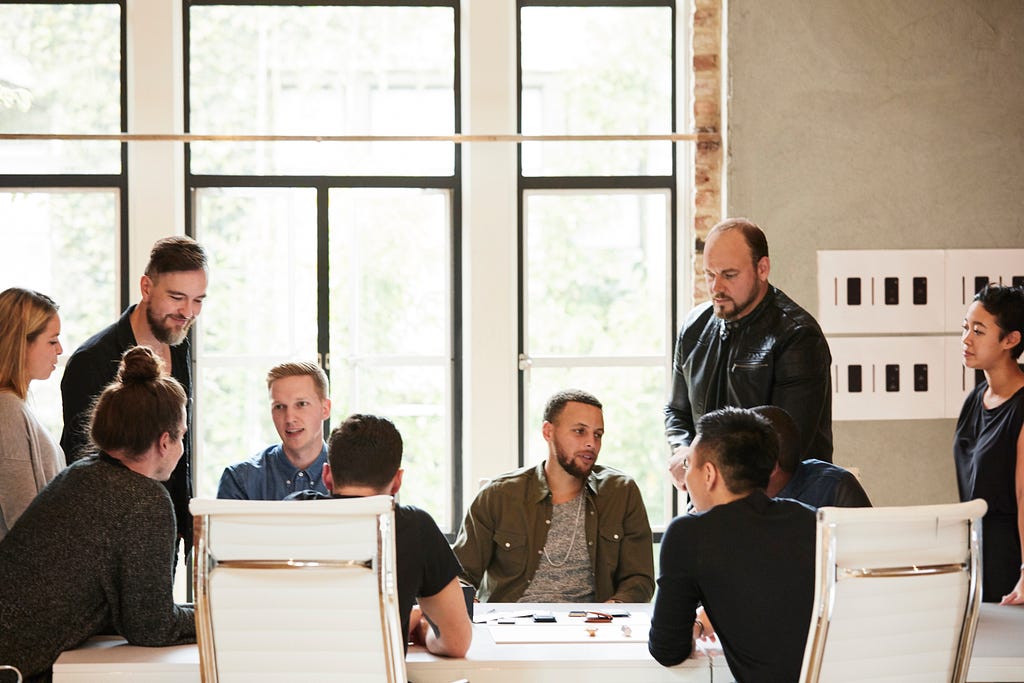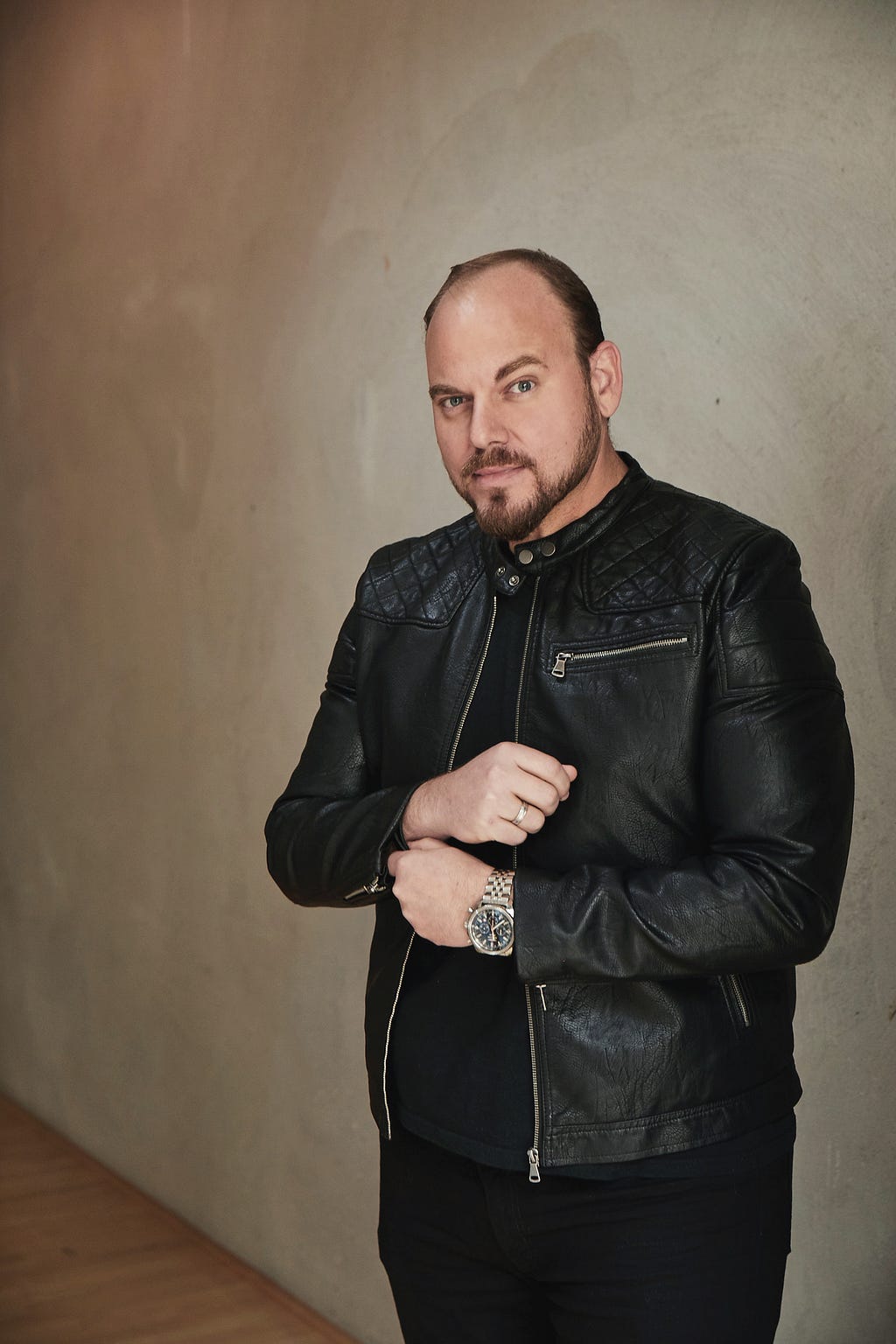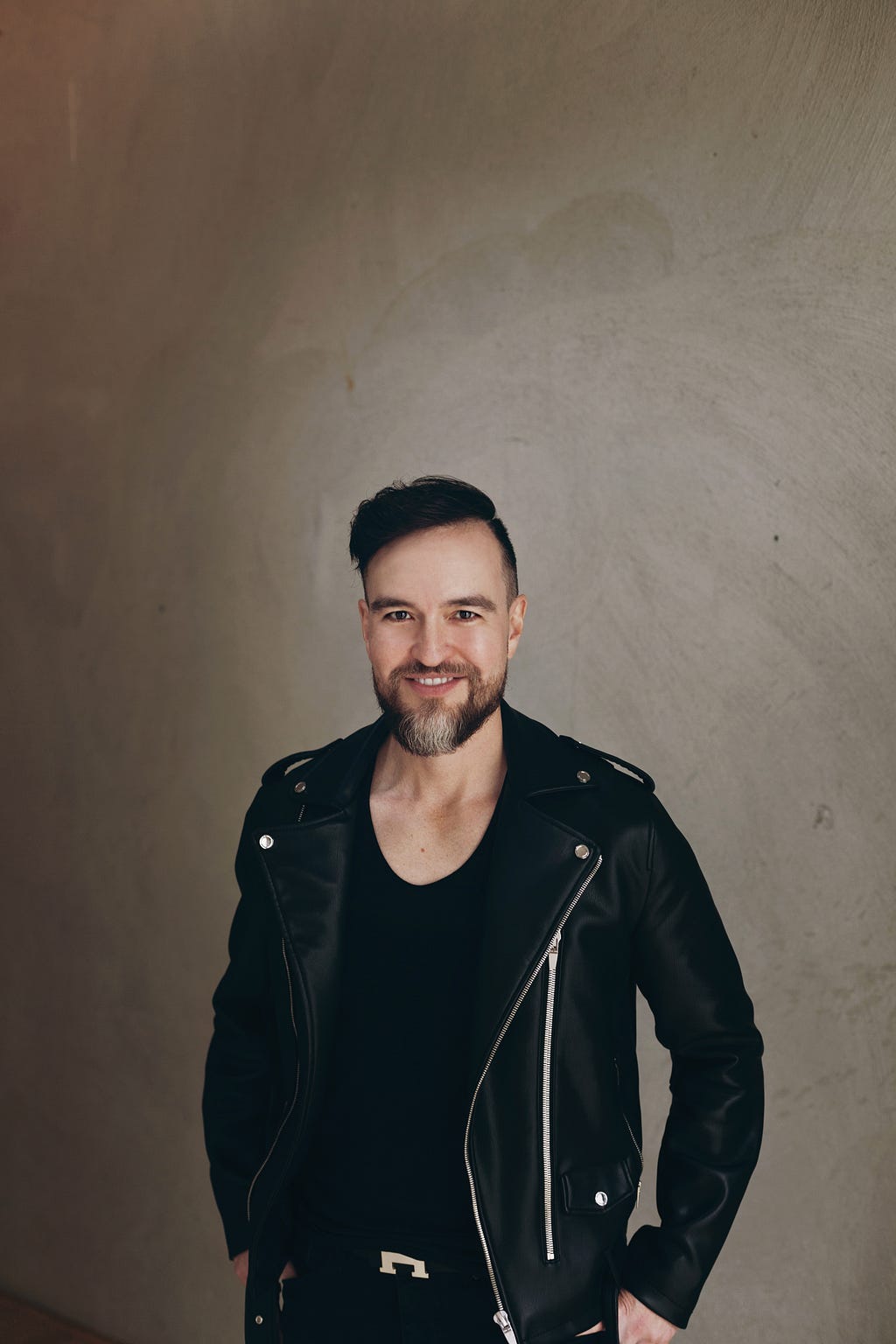Palm Founders Dennis Miloseski, and Howard Nuk: We would like to start a movement called #lifemode, to detox from our digital lives

We would start a movement called #lifemode. The industry creates products and apps that are designed specifically to tempt you, to make you feel like you are missing out if you don’t keep scrolling endlessly, to draw you away from real life as you know it. We need a detox — a detox from our digital lives. Let’s reconnect with those we love, engage in spontaneous conversations when in line at the coffee shop, and focus on improving our overall mental well-being.
I had the pleasure to interview Dennis Miloseski, CEO and Co-Founder, and Howard Nuk, CEO and co-founder, Palm. Based in San Francisco, Palm has been reinvented by co-founders Dennis Miloseski & Howard Nuk — Bay Area design leaders and entrepreneurs with over 20 years experience bringing tech and lifestyle products to market for some of the most renowned brands in the world.
At Palm, Dennis is bringing people out of their tech and into their lives. We’re reimagining how we interact with the physical and digital world — never compromising one for the other. And it starts with the technology we put into the palm of our hand.
As an industry thought leader and listed in Fast Company’s Most Creative People — my work and perspectives have been published in Time, The New York Times, Forbes, Fast Company, VentureBeat, CNET, Businessweek, and the Wall Street Journal among others. As an industry speaker, I have given keynote addresses at venues such as CES, GigaOM Mobilize, Engadget Expand, IPTV World, and Fast.Co Innovation.
Dennis attended Harvard Business School in 2014, and prior to that The Art Institute in Pittsburgh.
At Palm, Howard Nuk is bringing people out of their tech and into their lives. We’re reimagining how we interact with the physical and digital world — never compromising one for the other. And it starts with the technology we put into the palm of our hand.
Prior to Palm, Howard was the head of industrial design at Samsung Design America, his role was to provide leadership in the definition, design, and development of revolutionary products that live within the mobile ecosystem and home environment.
Howard has been listed as one of Fast Company’s Most Creative People and has also served on the jury for notable design competitions and has spoken at numerous design and tech talks. Howard’s work and opinions have been published in Time, Fast Company, CNET, Businessweek, Fortune, Forbes, Wall Street Journal, and Wired, among others.
Howard attended Carleton University where he earned a Bachelor’s Degree in Industrial Design.
Thank you so much for joining us! Can you tell us a story about what brought you to this specific career path?
DENNIS: I’ve always had a fascination for how things worked, even as a small child. Whether it was disassembling computers and rebuilding them — to later in life by tinkering and building engines for classic cars. I find a lot of joy in making things that bring a smile to others. Whether it’s working on a new product of its kind or growing grapes to make wine for family and friends. My natural curiosity of how things worked led to a hobby of sketching and designing for how things could be better. I was always fascinated by stories of science fiction and the future yet to come. It was later in life that I realized that I had the ability to turn some of that fiction into a reality. It was an understanding that the people who created the products that shaped our lives were no different than you or me and the best way to create the future that didn’t exist was to create it yourself.
HOWARD: I come from a family of mixed background, my father immigrated from Austria, and my mother from Taiwan. From a young age, I was taught diligence when it came to applying myself at school and the expectation was that I become a doctor or engineer. To procrastinate, I would sketch and doodle all over my workbooks. I actually found my creative outlet through sketching cars, architecture, comics, cartoons, you name it. Additionally, all of the hobbies I have had since I was young have revolved around making something better — improving on what already exists, because “good enough” has never been part of my vocabulary. Starting from when I was a teenager until today, I have always been interested in anything that went fast. Starting with skateboards, then to bikes, and later sports cars — I either built or heavily modified all of them to enhance their performance, and altered their aesthetic to make them more unique. Realizing my talent for drawing and passion for creativity, I was very lucky to have parents and mentors who helped me hone my skills and point me toward a career path where I could flourish. I knew on my first day of Industrial Design Studio 101, that I had found my path.

Can you share your story of Grit and Success? First can you tell us a story about the hard times that you faced when you first started your journey?
DENNIS: Love what you are doing, or it will break you. Any sane individual should avoid starting a company or being an entrepreneur unless the cause is worth fighting for at a deep personal level. You will endure some of the most difficult hardship you have ever faced, you will need to overcome things that even decades of experience hasn’t prepared you for, and it’s guaranteed that things will never go as planned. Be prepared to be opportunistic. Your end goal may not change, but the path to your goal requires you to shift strategies and be dynamic on a constant basis. This applied to almost every aspect of launching Palm, from fundraising to creating a hardware product from scratch, to securing our major carriers, and closing our strategic partners that helped launch Palm to the world. One realization is never to feel that you are alone with strategic partners in your corner. During hard times, leverage your connections and don’t be afraid to ask for help. You’ll quickly find that a mutual interest for success leads to an ability to leverage your network to make the impossible quite possible.
HOWARD: Building Palm as a new mobile company, reinventing the brand, creating the product and experience, has been far more enlightening than I could have ever imagined. From the inception of our venture, we have faced the highest euphoric peaks and the deepest emotional troughs, often times, back to back. In the span of two weeks, we met NBA MVP Stephen Curry for the first time at his practice gym (a surreal experience), we had secured a deal with the largest mobile carrier in the US (a Herculean feet for any startup), and at the same time realized that we had no way to fund our production due to an unforeseen distribution issue (certain death for the company). How’s that for a rollercoaster?
Where did you get the drive to continue even though things were so hard?
DENNIS: You approach every problem with an understanding that it can be solved one way or another, and sometimes with unconventional methods if necessary. Being a designer-first by profession allowed me to approach business problems creatively. As a startup founder you are asked to stretch into roles, whether its finance, business, contracts, or partnerships. A great strength also lies in not approaching problems with the conventional ways to solve them. An example of this is activating alternative solution paths to a problem, running them in parallel. It’s like playing chess on multiple boards at the same time, with winding outcomes unfolding.
HOWARD: As a designer, you think laterally every day, and nothing is a straight path. I have never been one to shy away from attacking problems from every angle, and in fact I see problems just as a series of milestones that reveal new opportunities. I used to love reading Choose your own Adventure books as a kid. If you choose the first path, you may sink your entire company into quicksand; if you choose the second path, you may fall into a well and die a slow death (perhaps by losing key partnerships); or if you choose the third path — you get to move on to the next part of the adventure. Your employes, your investors, and your families are counting on you to choose wisely.

So, how are things going today? How did Grit lead to your eventual success?
DENNIS: The most undervalued trait for success is relentless perseverance. On your path you will be confronted with countless situations which will either end your journey or push it forward. It’s not a matter of how great your original plan is, it’s about your ability to shift, adapt, and persevere which moves your vision forward. As the great business philosopher Mike Tyson said, everyone has a plan until they are punched in the mouth. Success is a matter of how hard you can get hit, get back up, and keep moving forward.
HOWARD: Gritty experiences develop calluses. Each time you live through a rough patch, it makes you stronger and wiser for the next time around. Eventually, what once felt like driving off a cliff, becomes a mere pot hole. As a startup founder, you can approach every obstacle with conventional book smarts, but life experiences will prove that street smarts are equally, if not more valuable when navigating the gauntlet of start-up-landia.
Can you share a story about the funniest mistake you made when you were first starting? Can you tell us what lesson you learned from that?
Dennis: After closing the Verizon deal, Palm was just a 5 person company. From the outside looking in, we appeared much larger than we actually were. During an executive planning session, Verizon asked how company growth was looking and we shared our plans to grow from five to eight employees within the year. With a long pause, our executive sponsor said, let’s just use percentages for my CEO report.
What do you think makes your company stand out? Can you share a story?
Dennis: Starting a hardware company in Silicon Valley isn’t necessarily a walk in the park. Launching a global brand and hardware product with a staff of eight employees is quite unconventional. Having the largest carrier in Verizon with NBA star Stephen Curry in our corner has been priceless. Challenging how technology fits in our lives at a time when digital addiction is at an all time high is definitely a conversation starter. After years of making people addicted to technology, we’re taking a step back and asking people to reconsider their relationship with screens. Our phones are not the enemy, our relationship with them is the opportunity.
HOWARD: We have been very fortunate to have so many huge strategic partners on this adventure with us. TCL as our global manufacturer and distribution partner, Verizon and Vodafone are two of the largest carriers in the world, and NBA MVP Stephen Curry is an amazing partner. But what stands out the most is the new mobile category we have created — the Ultra Mobile. We receive stories from Palm users every day about how it has changed their relationship with their digital life. When you wear a Palm around your neck, walking down the street, everyone is curious to know more. It’s definitely a conversation starter.
Which tips would you recommend to your colleagues in your industry to help them to thrive and not “burn out”?
DENNIS: Although difficult as a start-up founder, it is absolutely necessary to find those moments to unplug and allow your mind to rest and be creative. Ideas for solving some of our most difficult business challenges came while pruning my backyard vines on an early Saturday morning or working on a science project with my kids. It’s also very important to celebrate your wins, big or small. The mountain of work is never ending, however finding the time to celebrate and recognize the accomplishments along your journey go a very long way.
HOWARD: Buy a Palm. On a serious note, we were 18 months into the venture and preparing the final hardware and software, whilst hiring, raising capital, pre-briefing press, and managing distribution logistics, all at once. As you might imagine, each notification from Slack, email, text, Whatsapp, raised my blood pressure. You need time away from these distractions. We at Palm call it #lifemode — where you take a break from your tech and focus on you. Even if it’s just an hour a day, your well-being needs the recharge.
None of us are able to achieve success without some help along the way. Is there a particular person who you are grateful towards who helped get you to where you are? Can you share a story?
DENNIS: Starting a company in your 20s is one thing, doing it in your 40s with a family takes a level of patience, support, and understanding from your wife and children that goes beyond just being grateful. It’s essential for any founder to strike a balance of personal life, well being, and their work life. My wife Joanne is my foundation, grounds me, and brings a very real perspective to the many adventures of startup problem solving. My kids Adriana, 10 and Steven, 7 motivate me everyday to help make the world a better place through the products we create.
HOWARD: My partner Lindsay is my inspiration and my rock. We met 13 years ago at frog design where we overlapped for over 6 years. We have the perfect Yin Yang relationship. She, a leader on the business side of design brings balance to my life. She inspires me to strive for my goals and has taught me patience (a virtue I try to practice every day).
How have you used your success to bring goodness to the world?
DENNIS: Launching Palm and working with partners affords us an ability to use our presence for a greater social good. We have worked with Stephen Curry and our partners to promote a number of charities which include feeding the hungry and raising over 80 scholarships for kids with disabilities. In addition to our charitable involvement, the letters from our customers that bring smiles to our faces involve how Palm allowed them to reconnect with their family, friends, and hobbies in a much more meaningful way — where their smartphones took a backseat to real life experiences.

What are your “5 things I wish someone told me before I started my company” and why. Please share a story or example for each.
Dennis:
- Plan for how things could go wrong, in addition to plan A
- Everything will take longer than you think it will
- What doesn’t kill you will make you stronger
- Invest in your personal well-being, including your family
- Leverage your network and don’t be afraid to ask for help
HOWARD:
- Be patient and empathetic
- Time is the most valuable asset you have
- Showing up is half the battle
- Trust your gut
- Hire carefully and empower your team
Based on your experience, can you share 5 pieces of advice about how one can develop Grit? (Please share a story or example for each)
DENNIS:
- Activate multiple solution paths to every problem
- You will eventually be thankful for your hardships
- It’s ok to fail, learn and move on
- Don’t fear the unknown
- Make the right decisions, even if it sacrifices short-term gain
HOWARD:
- Stick to your convictions
- Never take no for an answer
- There is a way forward, period
- Make the hard decisions
- Always be open to pivot
You are a person of great influence. If you could start a movement that would bring the most amount of good to the most amount of people, what would that be? You never know what your idea can trigger. 🙂
HOWARD+DENNIS: We would start a movement called #lifemode. The industry creates products and apps that are designed specifically to tempt you, to make you feel like you are missing out if you don’t keep scrolling endlessly, to draw you away from real life as you know it. We need a detox — a detox from our digital lives. Let’s reconnect with those we love, engage in spontaneous conversations when in line at the coffee shop, and focus on improving our overall mental well-being.
Palm Founders Dennis Miloseski, and Howard Nuk: We would like to start a movement called #lifemode… was originally published in Authority Magazine on Medium, where people are continuing the conversation by highlighting and responding to this story.
